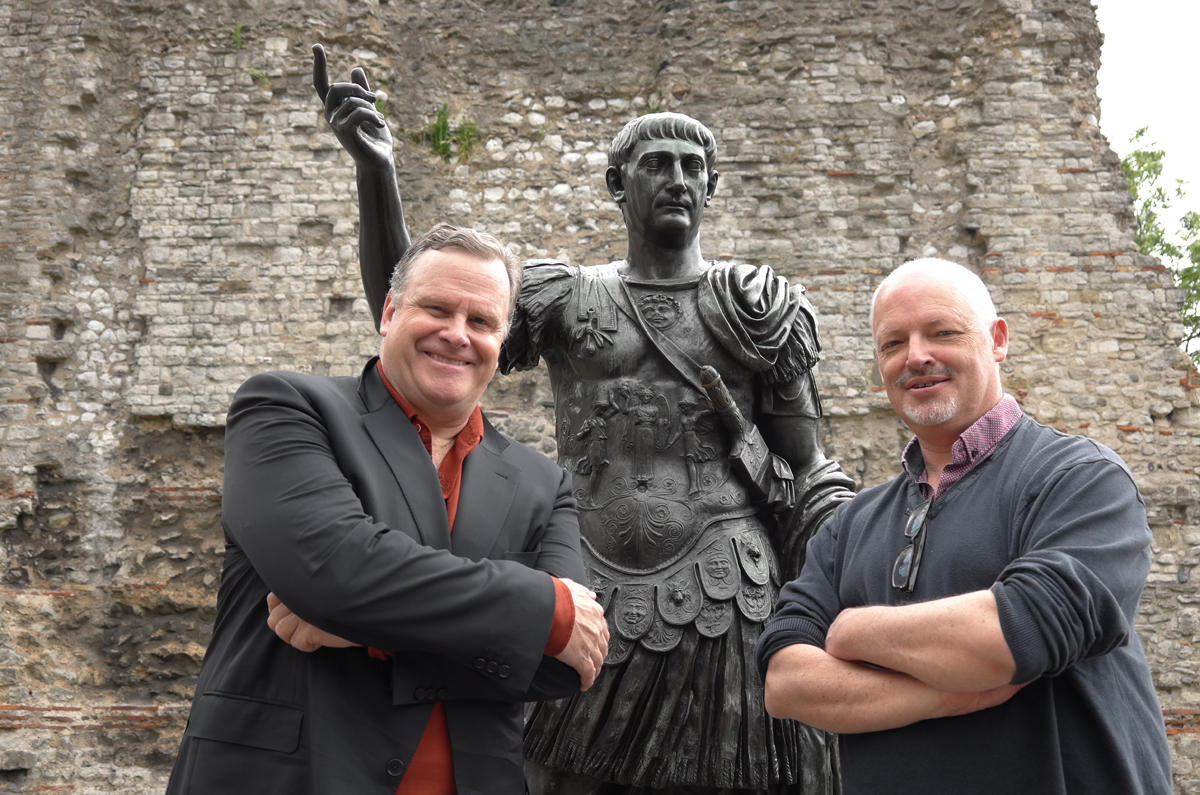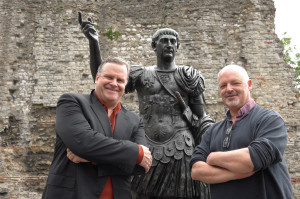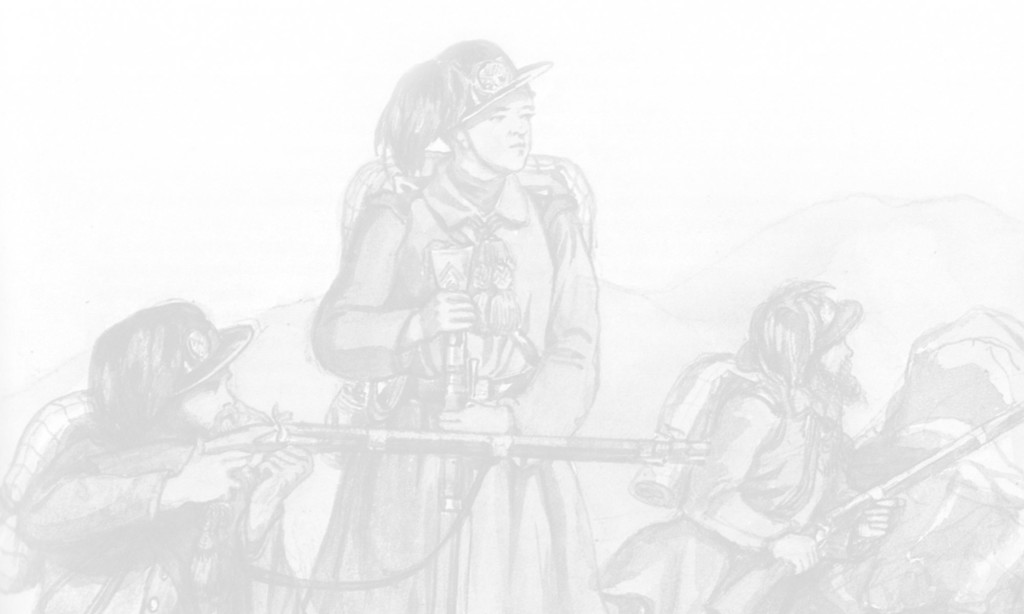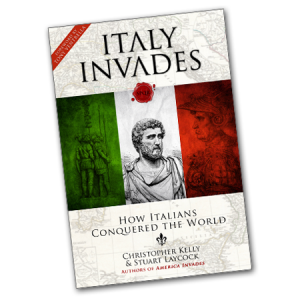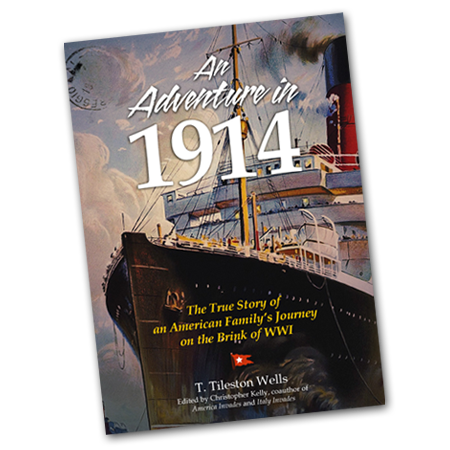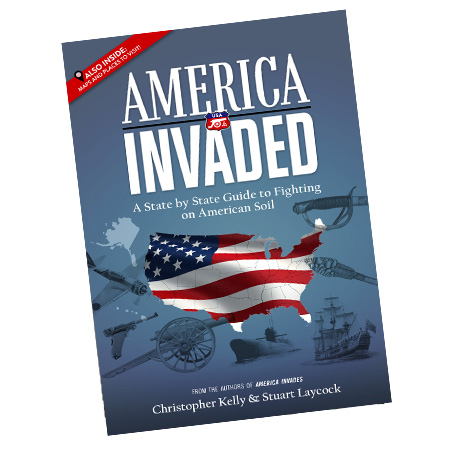Introduction by Christopher Kelly
A few years ago, a son asked his father, “Dad, how many countries have we invaded?” Stuart Laycock, the father, having studied classics at Cambridge, wrote a book to answer the question properly: All the Countries We’ve Ever Invaded: And the Few We Never Got Round To. Laycock’s book documented how Britain managed to invade or fight conflicts in nearly 90 percent of the world’s countries over the course of its history. It offered a chapter on every country in the world and a short summary of Britain’s military involvement with that country.
I read Stu’s book, reviewed it, and forwarded him the review. We met for a pint in London where we both live and became friends. As an American, I was curious about how America would compare to Britain when considering the topic of invasions. We coauthored America Invades: How We’ve Invaded or Been Militarily Involved with Almost Every Country on Earth, in which we demonstrated that Americans have invaded about 45 percent of the world’s countries and have been militarily involved with nearly all the rest. America is a military superpower that spans the globe with alliances and complex relationships.
Stu and I each have strong connections to and affection for Italy. Stu learned Latin, studied classics at Cambridge, has visited Italy many times, and has published several works on Roman Britain. My wife is an Italian American with roots in Calabria. We have a holiday apartment in Florence and are frequent visitors to Italy. My great-grandfather, Thomas Tileston Wells, visited the Italian Dolomites in the summer of 1914 just as World War I was breaking out (see an Appendix which contains an extract from his never before published An Adventure in 1914). He believed that Riva on Lake Garda in the Dolomites “is one of the most beautiful places in the world.” So it was natural that our thoughts turned toward Italy.
Italy has been the eternal birthplace of empires intent on conquest. Ancient Rome was a great world empire and had a profound influence on all those that followed in her wake; just think in terms of architecture, government, and language. How many countries did the Romans invade?
Niccolò Machiavelli was the philosopher of invasions. He offered this advice to future princes: “A ruler, then, must have no other aim or consideration, not seek to develop any other vocation outside war, the organization of the army and military discipline. This is the only proper vocation of the man in command.”
Just how many countries has Italy invaded? Start asking this question and you will likely raise many an eyebrow. Perhaps a snicker too. “You’re writing a book about Italian military history? That’ll be the world’s shortest book!” The Italian fighting spirit has been much maligned over the years. Stuart and I believe it’s time for a reevaluation.
This negative view of Italians’ military prowess is largely derived from their disastrous experience in World War II, when Mussolini thrust them into a war for which they were ill-prepared. When Mussolini declared war on the Allies in June of 1940, he thought he had placed a wager on the favorite to show, and that Italy would augment her empire by collecting easy territorial gains. Instead, he had bought Italy a long- shot ticket that would place her in a desperate battle against three great industrial powers—the British Empire, the Soviet Union, and the United States. Moreover, the Allied propaganda machine perpetuated a narrative of Italian military incompetence despite the bravery of the Italian soldier and a surprising number of Italian victories.
The years after 1945 served to cement the idea of unmilitary Italians, rather than to shake it. Despite the armistice of 1943 and the successes of Italians fighting in the Co-Belligerent forces on the side of the Allies, Italy emerged from the war bitterly divided politically. The nation had suffered massive loss of life and destruction of infrastructure, which yielded an entirely understandable cynicism about Mussolini’s militarism, his dreams of empire, and the devastation the war had brought to Italy. Unlike in 1918, Italy emerged in 1945 as one of the war’s great losers.
Italians themselves have been their own sharpest critics. When his son modified the uniforms of their Neapolitan troops, King Ferdinand of the Two Sicilies said, “My dear child, dress them in white or dress them in red, they will run just the same.” The great Italian patriot Garibaldi, in a moment of doubt, wrote that his countrymen were a “generation of hermaphrodites.” Mussolini declared that Italians were “a mediocre race of good-for-nothings only capable of singing and eating gelato.”
Italy has had a troubled, sometimes tragic, history. Rome lived by the sword and died by the sword. From the fall of Rome in the fifth century AD until the nineteenth century, Italy was, as Metternich put it, “a geographic expression.” Politically, it was divided into many different principalities and smaller states. To tourists, Italy is a land of unmistakably ancient history and tradition, but in terms of modern statehood, Italy, united in 1861, is younger than the United States.
In Alexandre Dumas’s classic novel, The Count of Monte Cristo (published in 1844–45), the Abbé Faria is asked by Edmond Dantès why he is imprisoned. The Italian cleric answers, “Because in 1807 I meditated the scheme Napoleon wished to realize in 1811; because, like Machiavelli, I desired to alter the political face of Italy, and instead of allowing it to be split up into a quantity of petty principalities, each held by some weak or tyrannical ruler, I sought to form one large, compact, and powerful empire. … Italy seems fated to be unlucky.”
Why was Italy unlucky? Why did she struggle for so many years to become a nation?
Machiavelli, who wrote The Prince in hopes of obtaining a job from Lorenzo de Medici, insisted that Italy lacked proper leadership. He wrote, “Italy is hardly lacking in raw material for the man who wants to give form to it. The limbs are healthy and strong; all they need is a head to guide them. Look at how much stronger, defter and more skillful Italians are than foreigners in duels or small skirmishes. But when it comes to armies they can’t compete. Because they are badly led.”
Some would say Italians have always been their own worst enemies. In ancient Rome, Republicans fought against the followers of Julius Caesar after Caesar’s assassination in the senate in 44 BC. Rome suffered through numerous civil wars, coups, and power struggles. According to legend, Romulus slew Remus. The Guelphs fought the Ghibellines. The Florentines battled the Sienese. The Venetians duelled with the Genoese for mastery of the Mediterranean. Garibaldi’s Redshirts needed to invade the Kingdom of the Two Sicilies to finally unite Italy into a modern state. After Mussolini’s arrest in 1943 and the Italian defection to the Allied side, World War II itself became a civil war for Italians that has left lasting scars on the face of Italy.
Mussolini claimed to use The Prince as his guidebook, but he crucially forgot Machiavelli’s injunction that, “Wars begin where you will, but they do not end when you please.” In April 1945, after enduring over four years of a ruinous war, Italians assassinated Mussolini and his mistress and resumed singing and eating the world’s finest gelato. One of Mussolini’s sons, Romano Mussolini, even became an accomplished jazz pianist in postwar Italy.
Has Italy been a victim of history?
Giuseppe Mazzini, the patriot of Italian unification, rejected the notion of Italian victimhood, proclaiming that Italy was a fortunate land with a special destiny. He asserted the greatness of Italy, saying, “There are not five Italies, or four Italies, or three Italies. There is only one Italy. God, who, in creating her, smiled upon her land, has awarded her the two most sublime frontiers in Europe, symbols of eternal strength and eternal motion – the Alps and the sea…. Rome shall be the holy Ark of your redemption, the temple of your nation…. Rome, by the design of Providence, and as the People have divined, is the Eternal City, to which is entrusted the mission of disseminating the word that will unite the world…. Just as, to the Rome of the Caesars, which through action united a great part of Europe, there succeeded the Rome of the Popes, which united Europe and America in the realm of the spirit, so the Rome of the People will succeed them both, to unite Europe, America and every part of the terrestrial globe. in a faith that will make thought and action one… The destiny of Rome and Italy is that of the world.
Italy was no mere “geographic expression” to Mazzini.
In spite of its disastrous fate in World War II, Italy has had an amazing record of military success, achievement, courage, and extraordinary leadership. We cannot ignore thousands of years of military prowess. Italians have, sometimes peacefully, sometimes militarily, transformed the world.
Consider, for example, a sample of points about Italian military and political prowess:
- The Roman army was, by far, the most powerful and successful fighting force in the ancient world. Roman armies, in fact, invaded or fought in at least fifty-one different countries, or 26 percent of all the world’s countries, by modern geographic reckoning. This is an astonishing tally considering that this happened before aviation and that the Romans were only aware of three of the world’s continents.
- The map of Roman military conquests influenced the development of languages around much of the world. This is why French, Italian, Portuguese, and Spanish are romance languages. The word pistol, for example, is derived from the Italian town of Pistoia. The popular type of pasta, fusilli, is closely connected to fucile, which means rifle, and the English word fusilier.
- The Italians have often been at the forefront of military science and engineering. The Romans reduced the fortifications of their enemies with ballistae, onagers (wild ass), scorpios (crossbows), battering rams, and elaborate siege towers. In his notebooks, Leonardo da Vinci, despite his revulsion at “the cruelty of men,” sketched designs for the helicopter, the parachute, the armored car or tank, and the submarine. The first aerial bombing raid was made by the Regia Aeronautica (Italian Royal Air Force) in Libya in 1911. Giulio Douhet (1869–1930), author of The Command of the Air, was a visionary proponent of air power in warfare. In 1943, Admiral Minisini and twelve engineers and technicians were pinched by the OSS and brought to the United States to develop the modern submarine.
- Italian generals have been among the greatest military leaders in the world. To this day, Caesar’s Commentaries is used as a teaching text at military academies such as West Point. The great conqueror Napoleon once said, “Io sono Italiano o Toscano, piutosto che Corso” (“I am more Italian or Tuscan than Corsican”). The ancestral home of the Bonaparte family is in San Miniato in Tuscany. Garibaldi’s Thousand Redshirts managed to conquer Sicily, defeating an army that initially outnumbered them by forty-two to one. President Lincoln was so impressed with Garibaldi’s Italian generalship, he offered him a command in the Union Army during the US Civil War.
- The design for the American Pentagon is based on Italian star fortification plans used during the Renaissance.
- Many popes based in Rome directed Christians to embark on crusades to the Holy Lands. Alexander VI, a Borgia pope, imposed the Treaty of Tordesillas, which split South America into Spanish and Portuguese bits in the fifteenth century. The Papal States had their own armies for many centuries. Pope John Paul II, with his special insight into Eastern Europe, helped to steer the West to victory in the Cold War.
- Italian explorers played a major role in the Middle Ages and the centuries afterwards, opening up the world to contact with Europe.
- In 1915, one hundred years ago, Italy joined the Allied cause in the First World War. By 1918, after bitter and brave fighting and massive losses (over 462,000 combat deaths), Italy had liberated the north of its country from Austro-Hungarian rule. Italy was one of the major victorious Allied powers at the Versailles Peace Conference, both respected and keen to spread its political and military influence farther across the Mediterranean basin. The largest invasion in world history has an Italian name— Operation Barbarossa (Barbarossa means redbeard and was the name of a Holy Roman emperor.) To their intense regret, Italians participated in Hitler’s disastrous invasion of Russia, and Napoleon’s as well.
- Since the Romans, Italy has fought or done peacekeeping duty in at least fifty different countries, or 26 percent of the world. In 2010, they were involved in peacekeeping missions in twenty-two different nations.
The Italian diaspora (running mainly from 1850 to 1955) had a profound impact on much of the world, including both North and South Americas. As a result, Italian Americans, who made up about one in twelve American servicemen in World War II, have fought in even more countries, including some missed by the Romans and warriors from Italy.
Italians are literally and figuratively an “outgoing” people. They built and trod the Roman roads. Many traveled on the Silk Road to Asia in search of wealth. Others used the sea as their road. From Marco Polo to Christopher Columbus, they have been some of the world’s greatest travelers, explorers, and adventurers. Italian pilots took to the air with the dawn of aviation.
Since the end of World War II, Italy has enjoyed relative peace in the world and has rediscovered other aspects of her ancient heritage. She rebuilt herself from the rubble of that war by launching a series of commercial and cultural invasions. In the postwar world, Italy’s much reduced armed forces have served honorably as Blue Helmets with UN peacekeeping missions around the world.
Italians have done more than just their military duty—they have kept singing and enjoying life. Italian opera is performed not only at La Scala in Milan, but also at opera houses from Sydney to Shanghai to San Francisco. Pizza is consumed worldwide. Italian wines are quaffed around the globe. Italian fashions cut una bella figura internationally. Bright red Ferraris roar though the streets of Beijing.
Modern Italians have largely beaten their swords into plowshares. They have exchanged their uniforms and togas for Armani business suits, their sandals for Tod’s shoes. In this way they continue to conquer the world.
These new Italian invaders are the softer side of globalization. But they cannot hide the true history of Italian military activity around the globe, a history that is far more extensive and has far more effect than most people realize.
The modern state of Italy has existed only since 1861. In this book, however, we have concentrated on Italian military activity in a much wider sense, to give a broad picture of the Italian people at war.
The Roman Empire eventually stretched across many peoples and many lands. At that time, most of those fighting in its armies were not ethnically Italian, and even many of its emperors in the later period were ethnically non-Italian. However, Italians remained important in the imperial hierarchy, and Rome remained both a key political, ideological, and spiritual (both pagan and Christian) focus, even with the rise of Constantinople. Therefore, it seems legitimate to include Roman campaigns within this book.
Similarly, we have included the activities of political entities that existed within the boundaries of modern Italy, such as the city-states of Genoa and Venice.
We have also considered the activities of Italians fighting in armies apart from those of Italian entities; and since Italians have immigrated to many lands around the world, we have included some key military actions by those of Italian descent who were citizens of countries outside Italy. We have paid particular attention to Italian Americans; but this is not primarily a history of Italian Americans, and therefore we have not attempted to cover in detail all the large number of military operations carried out by Italian Americans.
We have defined an invasion as conducting armed action in the land, sea, or air of a country beyond the boundaries of Italy. And we have classified the geography of the world in terms of today’s nation states since those are the boundaries that are generally of the most significance to today’s readers.
In a small book such as this, it is not possible to include every invasion and military action by Italians around the world, but we hope the selections we have made will help with the important job of reevaluating Italian military prowess and what it means to be Italian.
Finally, we are aware that some have questioned whether Christopher Columbus really came from Genoa, and have suggested other origins for the man. In this book, we have kept to the traditional narrative of his birth. We are also aware that some have questioned whether the word America really derives from Amerigo Vespucci. Again, we have kept with the narrative that this is the origin of America.
Emperor Marcus Aurelius wrote in his Meditations that “life is warfare, and a visit in a strange land.” We hope that our readers will enjoy exploring the many lands that Italian warriors have visited over an amazing history.
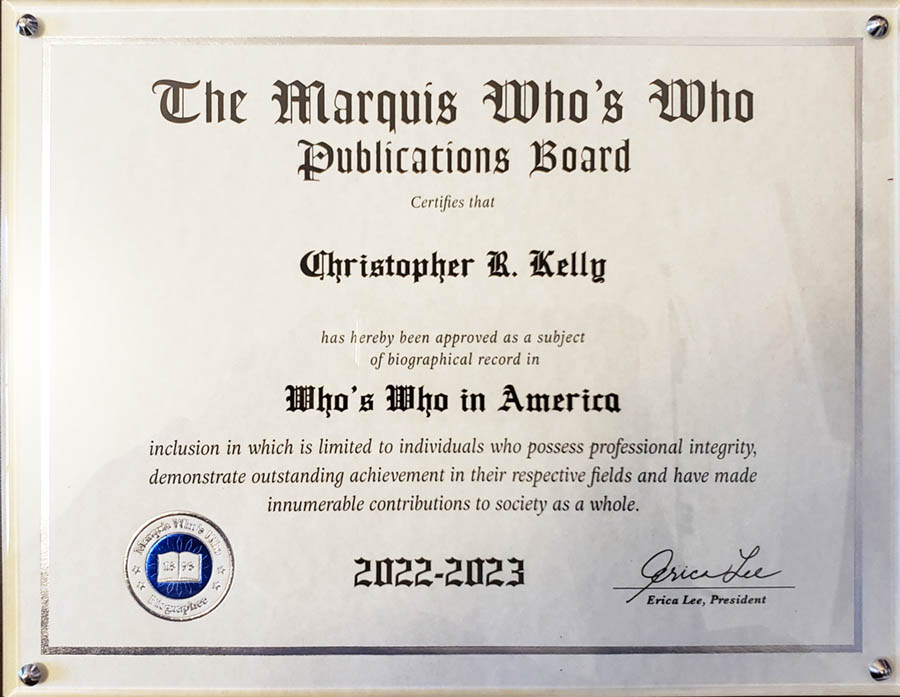
The Eric Hoffer Award announces a small set of grand prize award finalists. This small list or “short list” of finalists is an honored distinction of its own and is announced publicly during the spring of each award year prior to the grand prize announcement. We are happy to announce that Italy Invades was awarded the 2016 1st Runner up in the Legacy Non-Fiction category and its colorful book design was recognized as a distinguished Da Vinci Eye Finalist.


